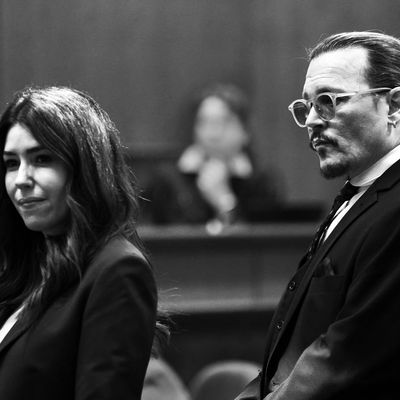
In the week since Johnny Depp won his defamation case against Amber Heard, survivors have been calling lawyers, panicking about what this verdict means for them. Should they reconsider coming forward or fighting their abusers’ libel suits? Will they be sued for things they said on social media? Their fears aren’t unfounded: Since the verdict, defamation attorney Alexandra Tracy-Ramirez says she has seen a sharp uptick in requests from men who have been accused of abuse wondering if they have grounds for a lawsuit. But she has found herself reminding prospective clients that Depp’s victory isn’t necessarily a road map for their own. Instead of a Hollywood ending, she explains that most plaintiffs should expect to bleed money while publicizing the most painful moments of their life. Even if the verdict has emboldened men to take retaliatory legal action — “a Johnny Depp effect,” she says — “you have to have a certain amount of power and resources and money to carry it through.”
Celebrity trials tend to distort reality. To the casual viewer who watched Depp emerge a heroic figure with a multimillion-dollar victory for suing over an op-ed that didn’t even mention his name, winning a defamation case may seem like a slam dunk. Marilyn Manson just filed one against Evan Rachel Wood, as did billionaire investor Leon Black to try and silence his rape accuser. Why shouldn’t anyone else who thinks their reputation has been smeared on social media or in police reports? But what didn’t appear in any of the TikToks mocking Heard’s testimony is the time and money the parties spent, or the many legal hurdles to filing a suit. While threats may become more common, defamation suits are primarily a tool of the rich and famous. The average Johnny does not have the means, the incentive, or a strong enough case to end up in court.
Heard and Depp have been locked in this legal battle for three years; now that Heard plans to appeal, it will drag on even longer. One expert estimated that he has spent over $5 million on legal fees, while she is reportedly “broke” and has been relying on her homeowners’ insurance to pay her attorneys. But even less prestigious lawyers typically charge hundreds of dollars an hour, which means going to trial could come with a price tag of more than $200,000. “The second you have to sit down with a lawyer where they map out what the budget is going to be, I think most litigants come to Jesus,” says Jay Ellwanger, an Austin-based civil-rights attorney who represents survivors of sexual violence.
Even if someone does have the money to front these legal fees, a victory, much less a multimillion-dollar one, is highly unlikely. Despite Depp’s success, which might have been influenced by a televised trial and un-sequestered jury, proving defamation is a complicated task (remember that in Britain, which has even stricter libel laws than in the U.S., Depp lost a similar case). A plaintiff has to prove that a statement made about them is both false and harms their reputation, and also that their accuser acted with malice or negligence, depending on the specifics of the case. On top of that, free speech is broadly protected by the First Amendment; 32 states have anti-SLAPP laws designed to discourage powerful people from pursuing these kinds of suits (Depp’s team strategically picked Virginia to take advantage of weak legislation). Any so-called defamatory statement that falls under a legal exemption, like accusations made within a lawsuit, won’t fly in court. “You will be fighting tooth and nail about the meaning of particular words,” says Tracy-Ramirez. “If the judge decides this isn’t really defamation, the case will get thrown out.”
While many legal experts were shocked that Heard’s op-ed wasn’t protected by the First Amendment — an argument that will certainly be made during her appeal case — Depp had another advantage over the typical defamation plaintiff: concrete claims of damage. The actor argued (with dubious evidence) that the piece caused him to lose a role in Pirates of the Caribbean and subsequent movie gigs that would have earned him millions of dollars. In the past week, Andrew Miltenberg, a New York–based lawyer who focuses on defamation and sexual-assault cases, has taken roughly a dozen calls related to the high-profile trial. One client suddenly wanted to double the money he would accept from a prospective settlement to a figure in the seven digits. But the average person looking to sue for libel usually can’t claim that level of material impact on their lives and will have trouble convincing anyone that “This isn’t just a lawsuit over hurt feelings,” says Tracy-Ramirez. “What are my damages? My second cousin at the July 4 party thinks I’m a dirtbag now,” says Jeanne Christensen, a New York–based lawyer who focuses on employment discrimination. “What does a jury think that’s worth?”
Even if the accused are more concerned with repairing their reputation, a lawsuit may backfire. As a public figure, Depp arguably had little to lose by taking Heard to court. The allegations were already out there — photos of her bruised eye and cut lip were published in People — and even if he’d lost in court, it wasn’t a bad gamble that fans would rush to his defense. Most people risk far more by dragging the accusations against them from the private to the public sphere. As we’ve seen with the Depp-Heard trial, a defamation suit, especially one between exes, requires them to showcase intimate, sordid details, a traumatizing process for both parties involved. If Johnny Depp hadn’t been a celebrity, Miltenberg wouldn’t have encouraged him to sue given all the evidence Heard would air against him. “Ten years from now, we may remember Johnny Depp because of his career and because of this trial,” he says. “But Jim Smith may just be referred to as ‘the guy who sued his ex-wife.’”
None of these obstacles to a defamation lawsuit invalidate the real panic and trepidation survivors feel in the aftermath of this verdict. It seems likely there will still be consequences in the courtroom, particularly for celebrity cases. Lisa Bloom, a civil-rights lawyer who has handled high-profile Me Too cases against Bill Cosby and Jeffrey Epstein, is now cautioning clients that, even without naming their powerful abuser, it can be legally dangerous to speak out. “I think this has really expanded what these guys can do with defamation cases beyond what any of us thought in the past was possible,” she says. “There’s a system of justice for people who have eff-you money, like Johnny Depp. Then there’s a system of justice for everybody else.” Even between unknown parties, jurors may be more inclined to side with plaintiffs given the pro-Depp coverage that cannibalized the internet. While every case is different, “it’s certainly possible that juries in the future may be a little more skeptical of abuse allegations as a result of this trial,” says Lee Berlik, a Virginia-based defamation lawyer.
Still, the lawyers I spoke to are reassuring victims of abuse that the risks of being sued and losing a libel case are low. “I think we’ll see more threats of lawsuits and even potentially more suits being filed” in the wake of the verdict, says Tracy-Ramirez. “But I don’t think that’s going to add up to more successful suits.”
Earlier this week, Miltenberg took a call from a woman who was second-guessing her decision to fight a defamation case after seeing what Heard had experienced. “Now they’re thinking, Oh my God, I can’t go through this,” he says. “This will break me emotionally and financially.” While he’s clear with clients that fighting a lawsuit is a personal decision that carries risks, he reassured her that her lawsuit would not attract anywhere close to the public attention or damages involved in a high-profile case. He wants clients to know that truth is still a strong defense. “If anything, this is the time for women to not hold back,” says Christensen. “Because that’s exactly what plenty of men — the ones that have reason to be worried about getting sued — want to happen.”





